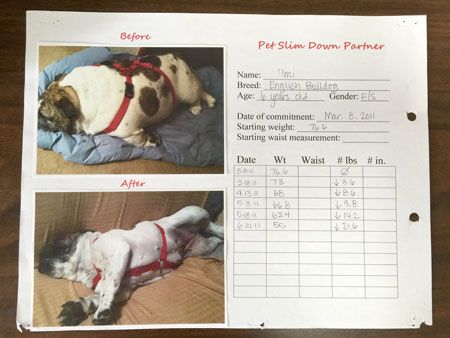Talk is cheapbut so is a weight loss program
It doesnt cost a lot to get proactive about your patients weight. Get everything you need to turn obesity talk into weight-loss action at your veterinary practice.

Here's an example of what the team at Seville Animal Hospital in Seville, Ohio, uses to track patients' weight loss. Image courtesy of Kim Murray, practice managerObesity is one of the most common conditions that veterinary teams face in practice these days. Sadly, pet owners can “love their pets to death” with overfeeding and under exercising.
And while underlying disease or slow metabolism might be a factor too, the reality is overweight pets are more prone to skin and respiratory disorders, renal dysfunction, heart disease, diabetes, arthritis, some cancers and in more severe cases, premature death. It's our job as veterinary professionals to educate our clients to understand the negative consequences of pet obesity and provide them with the tools to do what's best for their four-legged family members. It starts by having a weight loss program in place. Not one that you focus on just during obesity month but one that you practice all year round.
Use these five steps to turn obesity talk into weight-loss action.
1. Create and name your program
• Make your staff a check-list to follow for each obesity candidate
• Decide which prescription foods you include in your weight loss program
2. Train your staff to be successful weight loss coaches
• Educate your team members on the negative effects of obesity, feeding guides and how to speak to clients about weight management (click here for everything you need to educate team members and clients)
• Schedule a lunch and learn with your favorite food reps and ask them to provide you with in house marketing tools and weight loss tools to share with your clients
3. Follow through and monitor your program success
• Check in with your weight loss coaches every Monday morning to make sure they're on target-and cheer them on. How many new patients are signed up on the program? What obstacles are they facing? Do they have any questions?
• How are your clients doing? Are they feeding the prescribed food and coming in for routine weight checks? Make sure your weight loss coaches are following through with your clients.
4. Make it fun
• Individual goals and rewards: Give each staff a “weight loss coach” punch card. For every new patient they start on your program they get a punch on their card. Fill the card up and receive an awesome reward like hospital apparel, Starbucks gift cards, gas cards and so on.
• Team goals and rewards: Roll out the butcher paper and make yourself a poster to track your team's success. Draw a thermometer on the poster. Each new patient gets written on a line and your team members can take the honor of coloring it in with a crayon. Reach a team goal and treat your staff to something special.
When setting goals and rewards, remember the small mark-up on food, and the profit a full punch card will bring to your practice, and set goals accordingly. Your weight loss program will not make you rich. Instead it will add value to your patients' lives, which will lead to longevity with your practice and lead to revenue spent on other services and products. Ask your food reps if they have a budget to share with you to help offset the cost of your rewards. After all, you're working together to engage clients in their pets' care by offering high-quality diets that will help pets achieve a healthier lifestyle.
5. Promote, promote, promote
• Shout it from the social media rooftops! Facebook, Twitter and Instagram are great places to spread the word about your program and your patients' weight loss successes. Share before and after photos (with your client's permission, of course). This is free advertising at its best! Speaking of free, click here for ready-to-use posts and tweets about nutrition and obesity.
• Display it on the lobby bulletin board. Again, share before and after photos and give clients something to consider while they are waiting in your lobby.
• Advertise on your own website. Make a printable coupon for a free obesity examination with one of your well-educated weight loss coaches.
• Send an email or reminder to overweight pets-or better yet all your patients-announcing your awesome program. You never know, that fit dog patient may share a home with a slightly tubby tabby cat.
• Talk it up in your practice newsletter or blog. Share stories and photos of success stories.
Kim Murray is the practice manager at Seville Animal Hospital, Seville, Ohio.